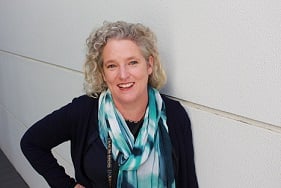
Marian Spencer talks about bringing people together, operating on a low budget and her passion for progressive social change

What is your current role and what brought you into it?
My current role is Head of Operations, People and Culture at the Black Dog Institute. The Black Dog conducts world leading workplace mental health research and educates workplaces in creating mentally healthy work places. It is my job to foster a positive and productive workplace culture that mirrors the best practice strategies emerging from evidence based research into mental health and wellbeing at work. This enables me to fulfil the other function of my role which is to attract and retain the best candidates for every role.
Many of us spend most of our waking weekday hours at work so I feel strongly that people should enjoy being there and feel mentally healthy, safe and valued while they are there. It is also incredibly rewarding to create a positive workplace environment because people value it highly and respond with high levels of engagement, productivity and gratitude.
What are some of your current HR challenges?
I think change is the biggest challenge for just about everyone in the workplace and particularly in the NFP sector. The change is driven by shifts in the political climate, funding environment and advances in technology and generally speaking people hate change. Change creates anxiety and stress levels which can be damaging to the psychological safety of the workplace so it needs to be managed in a manner which puts the highest priority on employee wellbeing.
Supporting people through change without an impact to the organisational culture is a big challenge.
What is the favourite part of your job?
I think the favourite part of my job is bringing people together socially and seeing how social connectivity fosters collaboration and collegiality. The Black Dog occupies quite a large building with people working in smaller separate offices sometimes geographically isolated from others whose work intersects or overlaps with theirs.
I organise numerous activities which bring people together, including a full staff meeting/lunch which involves up to 80 people every month. People from different areas of Black Dog, from finance and fundraising to research and clinical services, share information about what they are working on and afterwards everyone sits down and eats together.
What attracted you to a career in HR?
My background prior to HR was in the environment movement and more broadly in social change across the NFP sector. The people who work in this sector are driven by wanting to change things for the better - they do incredible work for comparatively little in return, I think they are the salt of the Earth. I realised that even in a very low budget environment you could create a positive and engaging workplace culture where people could use their strengths, enjoy their work and maximise the impact of that work.
What’s one piece of HR related advice you would offer?
Never forget that the resources you are dealing with are individual humans with differing strengths and weaknesses. Most people need safety, belonging and mattering in order to perform, be engaged, innovate and collaborate.
Overarching governance policies that ensure equity and due process are critical but the ability to be flexible and adaptable should never be lost.
What hobbies and interests do you have outside of HR?
I have a strong interest in progressive social change and community action. I like to lobby decision makers and challenge the status quo regarding causes I am passionate about. I enjoy a well organised rally or protest march which gives me the opportunity to join like minded people in a public show of outrage or strength regarding issues I consider important.
Please complete this sentence: If you weren’t working in HR, you would be…
Using my psychology degree to further train as a clinical psychologist.